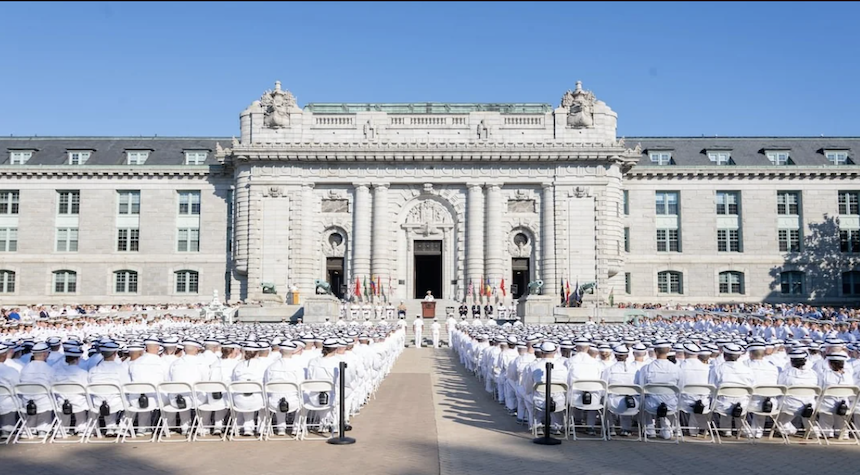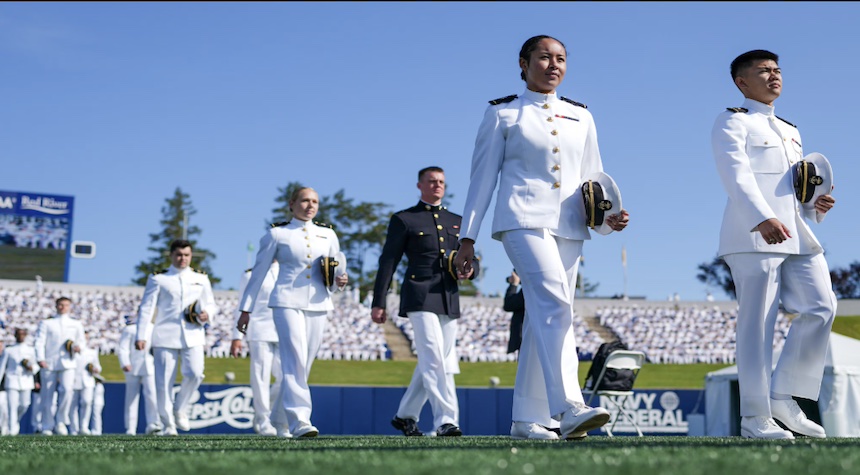Federal court documents released Friday reveal that the U.S. Naval Academy will no longer consider race, ethnicity, or sex as factors in its admissions process, following an executive order issued by President Donald Trump.
According to a filing of the U.S. Justice Department, Vice Adm. Yvette DAVIDS, the academy’s Superintendent, made the change in February in response to a January executive order by Trump. Circuit Court of Appeals.
In his order of Jan. 27, the president stated that “every member of the Armed Forces must operate without any preference based upon race or gender.” The order also instructed the secretary of defense to conduct an in-depth review on all “activities that promote a race or sex based preference system,” which includes reviews at service academies.
The court document made public on Friday stated that “under revised internal guidance issued to the Superintendent by February 14, 2025, race, ethnicity, or sex cannot be considered a factor in admission at any stage of the admissions process, including qualification and acceptance.”
A federal judge had ruled, in December, that the academy was allowed to continue evaluating race as part of its admissions criteria. The judge ruled that the academy should not be held to the same standards of civilian universities because military cohesion, national security and other factors were involved.

In a two-week bench trial held in September, the attorneys representing the academy argued the importance of diversity to the military, making it more effective and respected.
Students for Fair Admissions brought the case against this policy, and appealed the decision of the judge.
In a filing filed on Friday, the Justice Department requested that the current briefing schedule be suspended in this case until the parties have a chance to consider the new policy of the Academy.
The Justice Department stated that ‘the parties need a reasonable period of time to discuss details of the Academy’s new policy, and to determine the next steps in this litigation. This includes whether or not this litigation has become moot, and if it is, whether the District Court judgment should be overturned.
Edward Blum, the president of Students for Fair Admissions, praised the decision made by the academy.
Students for Fair Admissions is pleased to announce that the U.S. Naval Academy will stop its illegal and unfair race-based admissions policy. Blum stated that racial discrimination was wrong and that racial categorizations had no place in our nation’s academies.
Rep. Sarah Elfreth (D-Md. ), who is a member of the Academy’s Board of Visitors and has criticized this change. She said, “This disastrous decision will have negative consequences on our military recruitment and retention in the coming decades.”

“A Navy or Marine Corps that reflects the diversity of America is our strongest Navy or Marine Corps.”Diversity and inclusion allows our academies not only to reflect the diversity of our country but are also critical to mission readiness, and strong national security.”
Students for Fair Admissions brought a lawsuit against affirmative action in the United States that led to a landmark ruling by the U.S. Supreme Court in 2023.
The conservative majority of the high court has banned all considerations for race and ethnicity when it comes to college admissions. This ends a longstanding practice that was meant to increase opportunities for historically marginalized communities and sends shockwaves through higher education. It did, however, allow for a possible exemption to apply to military academies. This suggests that national security concerns could influence the legal analysis.
Later, Students for Fair Admissions sued the Annapolis Naval Academy to challenge the exemption. But Judge Richard Bennett dismissed their arguments and said that the Naval Academy had “established an overwhelming national security interest” in a diverse officers corps.
Attorneys for this group argued at trial that giving priority to minority candidates was unfair and would not be fair to white applicants who are qualified. They also argued that cohesion could come from other sources, such as training or command structure.
According to testimony in court, the academy claimed that it considers a number of factors when determining admissions, including grades and extracurricular activities. It also takes into account life experience and socioeconomic status. In court documents, attorneys for the Academy wrote that race was not always considered in the admissions process.

